Social media management is the strategic process of managing a business’s online presence across various social media platforms. It involves creating, curating, and distributing content that engages with the target audience and aligns with the brand’s goals. For businesses of all sizes, social media management has become a crucial component of their marketing strategies. By effectively utilizing these platforms, businesses can enhance brand awareness, build customer relationships, drive website traffic, and ultimately increase sales. This guide will delve into the key aspects of social media management, providing valuable insights and practical tips to help businesses navigate the digital landscape successfully.
Article Outline
What is Social Media Management?
Social media management is the strategic process of managing a business’s online presence across various social media platforms. It involves a combination of tasks aimed at building and maintaining a strong online community while achieving specific business objectives.
Key Tasks Involved in Social Media Management
- Content Creation: Developing engaging and relevant content that resonates with the target audience. This includes blog posts, articles, images, videos, and other forms of media.
- Content Scheduling: Planning and scheduling content to be published at optimal times to maximize reach and engagement.
- Audience Engagement: Interacting with followers through comments, messages, and social media listening to build relationships and foster loyalty.
- Analytics and Reporting: Tracking key metrics to measure the effectiveness of social media campaigns and make data-driven decisions.
- Community Management: Building and nurturing a supportive online community around the brand.
The Role of Social Media in Modern Business Strategies
In today’s digital age, social media has become an indispensable tool for businesses. It provides a platform to connect with customers, build brand awareness, and drive sales.
“At Rocket Moving Services, social media has played an important role in expanding our brand’s reach,” said Christopher Vardanyan, CEO and co-founder. “By sharing customer success stories and practical moving tips, we’ve genuinely connected with our audience. This approach has resulted in a 12% increase in demand for our services, as clients increasingly recognize us as a trusted and experienced moving partner.”
By effectively managing their social media presence, businesses can:
- Enhance brand visibility: Reach a wider audience and increase brand recognition.
- Build customer relationships: Foster trust and loyalty through personalized interactions.
- Drive website traffic: Redirect social media followers to the business website.
- Generate leads and sales: Promote products and services, and convert followers into customers.
- Gather customer insights: Gain valuable feedback and insights to improve products and services.
As businesses continue to embrace the power of social media, effective social media management is essential for staying competitive and achieving long-term success.
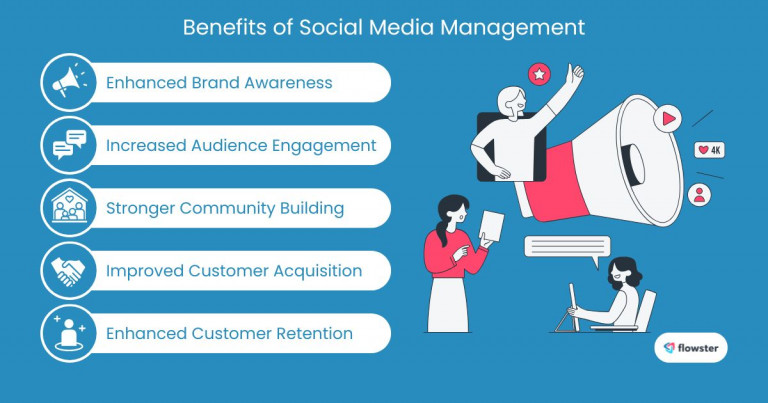
Why Social Media Management is Crucial for Business Success
Effective social media management is not just a trend but a necessity for businesses seeking to thrive in today’s digital landscape. It offers numerous benefits that can significantly impact a company’s growth and success.
Benefits of Effective Social Media Management
- Enhanced Brand Awareness: Social media platforms provide a vast reach, allowing businesses to showcase their brand to a wider audience and increase brand recognition.
- Increased Audience Engagement: By consistently creating engaging content and interacting with followers, businesses can foster stronger relationships with their target audience.
- Stronger Community Building: Social media enables businesses to create and nurture a dedicated community of loyal customers who are more likely to advocate for the brand.
- Improved Customer Acquisition: Social media marketing can effectively attract new customers and drive conversions through targeted advertising and organic reach.
- Enhanced Customer Retention: By providing excellent customer service and addressing concerns on social media, businesses can improve customer satisfaction and loyalty.
Impact of Social Media on Business Growth
- Increased Revenue: Studies have shown that businesses with active social media presences often experience higher revenue growth compared to those without.
- Higher Conversion Rates: Social media can drive significant traffic to a business’s website, leading to increased conversions and sales.
- Improved Customer Acquisition Costs: Social media marketing can be more cost-effective than traditional advertising methods, helping businesses acquire new customers at a lower cost.
How Social Media Management Influences Customer Loyalty and Business Credibility
- Improved Customer Service: By promptly responding to customer inquiries and addressing concerns on social media, businesses can demonstrate excellent customer service and build trust.
- Enhanced Reputation Management: Social media can be used to monitor and manage online reputation, helping businesses address negative feedback and maintain a positive image.
- Increased Credibility: Consistent and engaging social media activity can establish a business as an industry leader and enhance its credibility.
As businesses continue to recognize the immense value of social media, effective social media management has become a critical component of successful marketing strategies. By leveraging the power of these platforms, businesses can build strong brands, engage with customers, and drive sustainable growth.
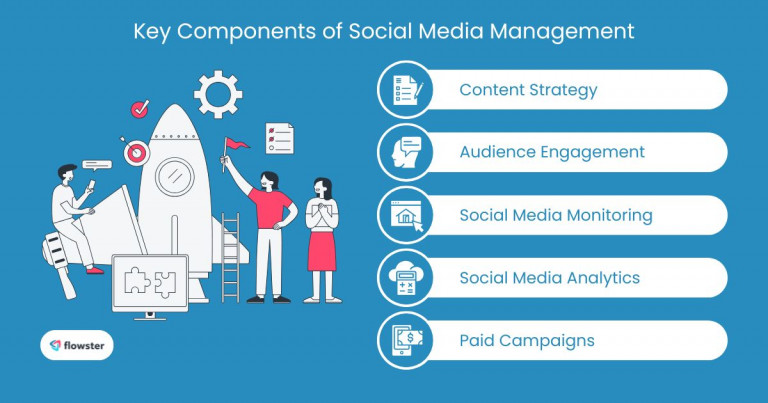
Key Components of Social Media Management
A successful social media management strategy requires a comprehensive approach that encompasses several key components. These components work together to ensure that a business’s online presence is effective, engaging, and aligned with its overall goals.
Content Strategy
- Content Planning: Developing a content calendar that outlines the types of content to be published, the frequency of posts, and the target audience.
- Content Creation: Producing high-quality content that is relevant, informative, and visually appealing.
- Content Curation: Sharing valuable content from other sources to provide additional value to followers.
Audience Engagement
- Community Building: Fostering a sense of belonging and connection among followers.
- Social Listening: Monitoring online conversations to identify trends, opportunities, and potential issues.
- Customer Support: Responding promptly to comments, messages, and mentions to address customer needs and concerns.
Social Media Monitoring
- Brand Mentions: Tracking mentions of the brand, products, or services across various social media platforms.
- Sentiment Analysis: Identifying and analyzing the sentiment of online conversations to gauge public opinion.
- Crisis Management: Developing a plan to respond to negative or crisis-related situations effectively.
Social Media Analytics
- Key Performance Indicators (KPIs): Tracking and measuring key metrics such as reach, engagement, conversions, and return on investment (ROI).
- Data Analysis: Analyzing data to identify trends, strengths, weaknesses, and areas for improvement.
- Reporting: Creating regular reports to communicate the effectiveness of social media efforts to stakeholders.
Paid Campaigns
- Advertising Platforms: Understanding the different advertising options available on various social media platforms.
- Targeting: Identifying the ideal target audience based on demographics, interests, and behaviors.
- Campaign Creation: Developing effective ad campaigns with compelling visuals and persuasive messaging.
- Budget Management: Allocating and managing advertising budgets to maximize ROI.
By effectively implementing these key components, businesses can build a strong and successful social media presence that drives engagement, generates leads, and contributes to overall business growth.
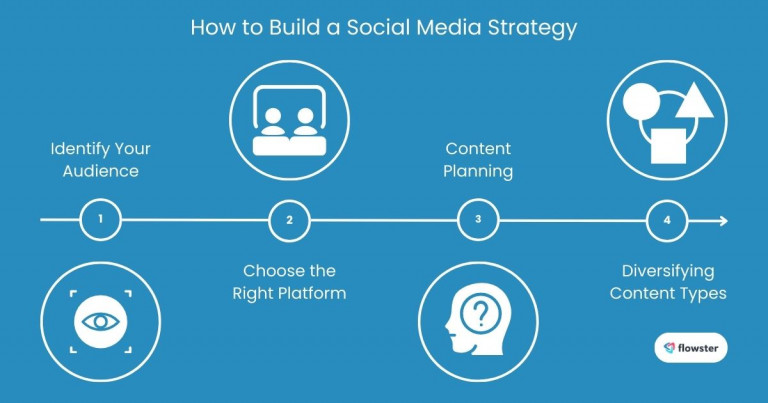
How to Build a Successful Social Media Management Strategy
Developing a successful social media management strategy requires a well-thought-out approach that aligns with your business objectives and resonates with your target audience. By following these key steps, you can create a compelling online presence that drives engagement and results.
Identify Your Audience
- Customer Personas: Create detailed profiles of your ideal customers, including their demographics, interests, and behaviors.
- Research and Analysis: Conduct market research to understand your target audience’s preferences and habits.
- Social Media Listening: Monitor conversations on social media to gain insights into your audience’s needs and pain points.
Choose the Right Platforms
- Platform Analysis: Evaluate the strengths and weaknesses of different social media platforms.
- Audience Overlap: Identify where your target audience is most active and concentrate your efforts on those platforms.
- Business Goals: Consider your business objectives and select platforms that align with your marketing goals.
Content Planning
- Content Calendar: Create a structured plan for your content, including topics, themes, and publishing dates.
- Alignment with Goals: Ensure your content aligns with your business objectives and provides value to your audience.
- Consistency: Maintain a consistent posting schedule to build anticipation and engagement.
Diversifying Content Types
- Variety is Key: Experiment with different types of content, such as text posts, images, videos, and stories.
- Visual Appeal: Use high-quality visuals to capture attention and make your content more engaging.
- Storytelling: Incorporate storytelling elements to connect with your audience on a deeper level.
By following these steps and continuously adapting your strategy based on performance data, you can build a successful social media management strategy that drives engagement, builds brand awareness, and achieves your business goals.
Flowster's AI-Driven Automation
Tools Every Social Media Manager Needs
Effective social media management relies on a suite of powerful tools that can streamline tasks, save time, and improve overall efficiency. By leveraging the right tools, social media managers can optimize their workflows and achieve better results.
Overview of the Best Social Media Management Tools
- Sprout Social: A comprehensive platform offering features such as scheduling, publishing, engagement tracking, and analytics.
- Hootsuite: A popular tool for managing multiple social media accounts, scheduling posts, and monitoring conversations.
- Flowster: A specialized tool for managing social media campaigns, automating workflows, and tracking performance.
- Buffer: A user-friendly tool for scheduling posts, analyzing performance, and collaborating with team members.
- Canva: A versatile design tool for creating visually appealing graphics, videos, and other content.
- Google Analytics: A powerful tool for tracking website traffic, user behavior, and the impact of social media campaigns.
How Tools Streamline Posting, Monitoring, and Engagement
- Scheduling: Automate the posting of content across multiple platforms to save time and ensure consistent engagement.
- Monitoring: Track brand mentions, respond to comments and messages, and identify trends and opportunities.
- Engagement: Use tools to engage with followers, participate in discussions, and build relationships.
Importance of Automation for Saving Time and Improving Efficiency
- Time-Saving: Automation allows social media managers to focus on higher-level tasks and strategic planning.
- Consistency: Ensure consistent posting schedules and maintain a strong online presence.
- Efficiency: Streamline workflows and reduce the risk of errors.
- Scalability: Handle increased workload and manage multiple accounts effectively.
By utilizing the right tools, social media managers can optimize their workflows, save time, and achieve better results. The availability of powerful social media management tools has made it easier than ever to effectively manage an online presence and drive business growth.
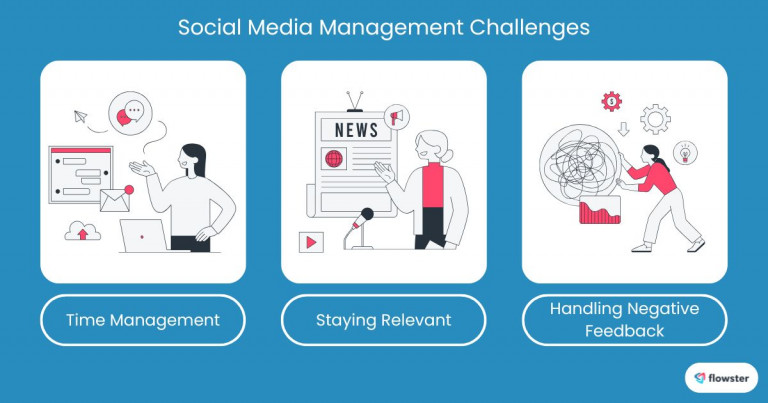
Common Challenges in Social Media Management and How to Overcome Them
Effective social media management can be challenging, even for experienced professionals. Understanding and addressing common challenges can help businesses overcome obstacles and achieve their goals.
Time Management
- Prioritization: Identify and prioritize tasks based on their importance and urgency.
- Scheduling: Use tools and techniques to schedule your social media activities and avoid feeling overwhelmed.
- Delegation: If possible, delegate tasks to team members or outsource to freelancers to free up time.
Staying Relevant
- Algorithm Updates: Stay informed about changes in social media algorithms and adjust your strategies accordingly.
- Trend Analysis: Monitor industry trends, competitor activities, and audience preferences.
- Content Experimentation: Continuously test different types of content to identify what resonates best with your audience.
Handling Negative Feedback
- Empathy and Apologies: Acknowledge and respond to negative feedback promptly and empathetically.
- Problem-Solving: Actively work to resolve the issue and address the customer’s concerns.
- Public Relations: If necessary, use public relations strategies to manage negative publicity and restore trust.
By understanding and addressing these common challenges, businesses can overcome obstacles and create a successful social media presence. With effective time management, staying relevant, and handling negative feedback, businesses can build strong relationships with their audience and achieve their marketing goals.
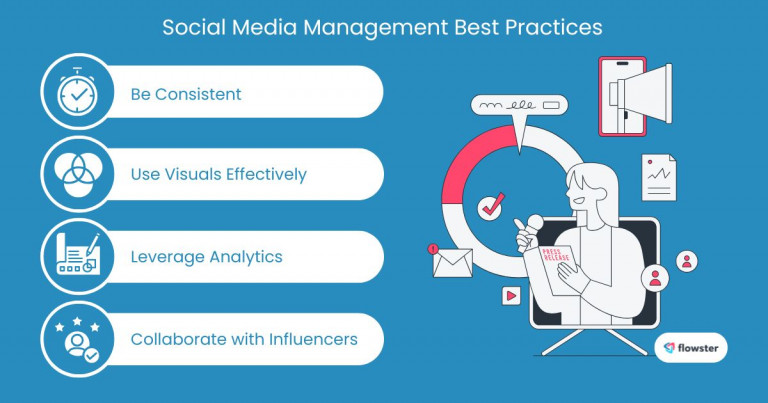
Social Media Management Best Practices
Effective social media management requires adherence to certain best practices that can help optimize your online presence and achieve your goals. By following these guidelines, you can create a successful social media strategy that drives engagement, builds relationships, and contributes to business growth.
Be Consistent
- Regular Posting: Maintain a consistent posting schedule to keep your audience engaged and informed.
- Content Calendar: Use a content calendar to plan and schedule your posts in advance.
- Engagement: Respond to comments, messages, and mentions promptly to foster a sense of community.
Use Visuals Effectively
- High-Quality Images: Use high-resolution images and videos that are visually appealing and relevant to your content.
- Infographics: Create infographics to present complex information in a visually engaging way.
- Video Content: Leverage video content to capture attention, increase engagement, and share stories.
Leverage Analytics
- Track Performance: Monitor key metrics such as reach, engagement, clicks, and conversions.
- Identify Trends: Analyze data to identify trends, strengths, weaknesses, and areas for improvement.
- Optimize Strategy: Adjust your strategy based on data-driven insights to maximize results.
Collaborate with Influencers
- Identify Influencers: Find influencers who align with your brand and target audience.
- Partner Collaborations: Create mutually beneficial partnerships with influencers to expand your reach and credibility.
- Sponsored Content: Consider sponsored content or influencer marketing campaigns to promote your brand.
By following these best practices, businesses can create a successful social media presence that drives engagement, builds relationships, and contributes to overall business growth. Consistent posting, effective use of visuals, data-driven decision-making, and influencer collaborations are essential components of a thriving social media strategy.
Capture Your Processes in Minutes!
Conclusion: The Power of Social Media Management
Effective social media management is no longer optional for businesses seeking to thrive in today’s digital landscape. By understanding and implementing the strategies outlined in this guide, businesses can harness the power of social media to enhance brand awareness, engage with customers, and drive growth.
Don’t wait to start building or improving your social media strategy. The benefits are immense, from increased brand visibility and audience engagement to improved customer loyalty and sales.
Explore the wealth of tools and services available to support your social media management efforts. From scheduling platforms and analytics tools to comprehensive social media management solutions, there are resources to help you streamline your workflows and achieve your goals.
Get started with free social media management workflow templates from Flowster Marketplace. These templates can provide a solid foundation for your strategy and help you organize your tasks and processes.




